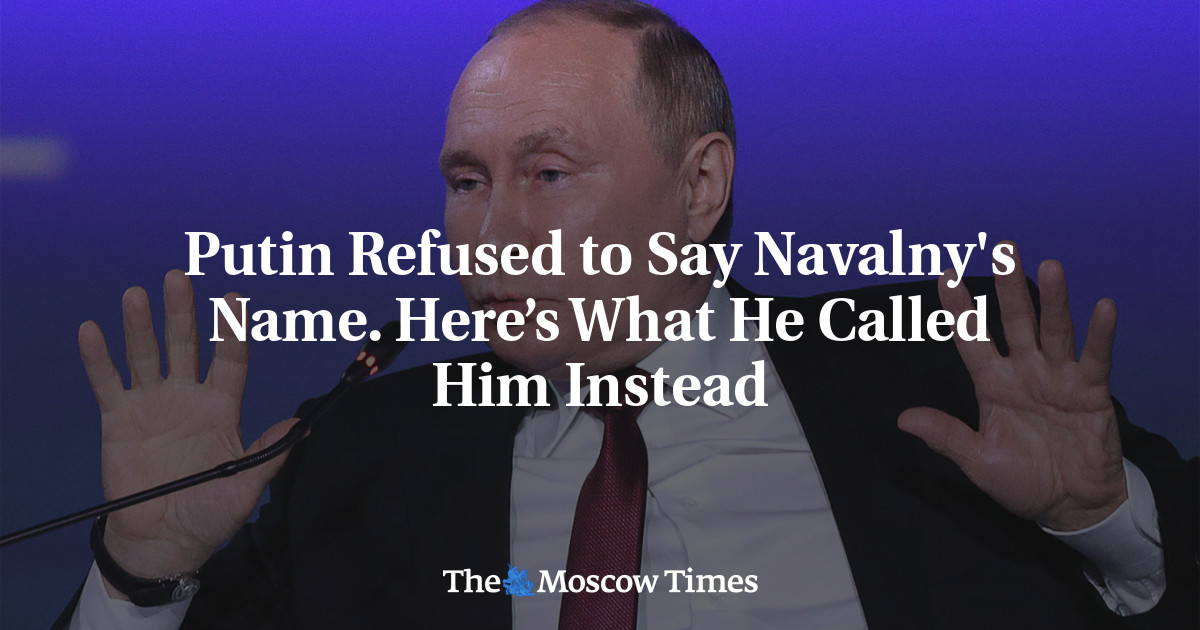
Anti-corruption activist Alexei Navalny, whose death was announced by Russian officials on Friday, was one of the Kremlin’s most outspoken domestic critics for more than a decade.
Despite numerous arrests and efforts to hinder his activities, Navalny, 47, remained one of the most popular opposition figures in Russia and a thorn in the Kremlin’s side.
The Kremlin has insisted that Navalny, 47, did not represent a real political threat. But President Vladimir Putin famously avoided speaking Navalny’s name, instead calling him “that character,” “this gentleman,” “a poor excuse for a politician” and “a certain political force.”
Putin has not yet commented on Navalny’s announced death. Kremlin spokesman Dmitry Peskov said the president had been informed of the news.
Here is a look at how Putin has talked about Navalny over the years:
Putin has repeatedly said that he does not fear Kremlin opponents.
During an annual press conference in 2017, presidential candidate and journalist Ksenia Sobchak asked Putin about the 2018 presidential elections and Navalny, who was barred from the elections due to his previous criminal conviction which his supporters claimed was politically motivated.
“People understand that being an opposition activist in Russia means that you will either be killed or imprisoned,” Sobchak said. “Is the government afraid of fair competition?”
“I assure you,” Putin said in response, “the authorities are not afraid of anyone and have never been afraid of anyone.”
2018
Speaking about the 2018 presidential elections and the fact that Navalny was barred from running for the presidency, Putin said that the opposition politician was apparently the person whom the West “would like to promote into the political sphere of Russia and see in the leadership of the country.”
“The character you mentioned [Navalny] is not the only one who was not allowed [to participate in the presidential elections], for some reason others are not named [in the United States],” Putin said.
“This apparently speaks to the preferences of the American administration and the leadership of other countries,” Putin said, emphasizing that the U.S. “made a mistake in this sense” and “it would be better if they kept quiet.”
2020
In 2020, Navalny was evacuated to Germany for treatment after a near-fatal 2020 poisoning that he blamed on the Kremlin.
Western scientists identified the poison as the banned Soviet-designed nerve agent Novichok, while investigative journalists traced the attack to Russia’s security services.
The Kremlin has repeatedly denied involvement.
During his end-of-year news conference, Putin asserted that if someone had wanted to poison the Kremlin critic, “they would have, most likely, carried it through.”
“With regard to the patient of a Berlin clinic…this patient of a Berlin clinic has the support of the special services, those of the United States in this particular case. And if this is the case, then it gets interesting and the special services should, of course, be looking after him,” Putin said.
“However, this does not mean at all that he must be poisoned. Who cares about him? If they really wanted to, they would have, most likely, carried it through,” he added.
2021
In January 2021, Navalny was arrested upon his return to Moscow for breaching the terms of a 2017 suspended sentence while in recovery abroad — a charge his allies viewed as politically motivated.
His arrest sparked nationwide protests calling for his release. That summer, Navalny’s organizations were banned as “extremist,” putting his allies and employees at risk of criminal prosecution.
That year, Putin said he was not “afraid of Navalny” during an interview with NBC.
“Who says that I feel threatened by opposition or we are threatened by opposition? Who told you that I’m scared by opposition? It’s just funny,” Putin said, answering a question about Navalny.
The interview was recorded shortly after Navalny’s organizations were outlawed and several independent media outlets were labeled “foreign agents.”
“You are presenting it as dissent and intolerance towards dissent in Russia. We view it completely differently…I believe that it is justified,” Putin added.
“We don’t have this kind of habit, of assassinating anybody,” Putin said when asked if he ordered Navalny’s killing.
Answering the question if Putin could personally ensure that Navalny would leave prison alive, the president said that Navalny was just “one of the citizens of the Russian Federation who has been found guilty by a court of law and is in prison.”
“He will not be treated any worse than anybody else. Nobody should be given any kind of special treatment. It would be wrong,” Putin said.
“Everybody should be in an equal situation. This is called the ‘most favored nation’ treatment. Not worse than anybody else. And the person that you have mentioned, that applies to him as well,” he added.
… we have a small favor to ask.
As you may have heard, The Moscow Times, an independent news source for over 30 years, has been unjustly branded as a “foreign agent” by the Russian government. This blatant attempt to silence our voice is a direct assault on the integrity of journalism and the values we hold dear.
We, the journalists of The Moscow Times, refuse to be silenced. Our commitment to providing accurate and unbiased reporting on Russia remains unshaken. But we need your help to continue our critical mission.
It’s quick to set up, and you can be confident that you’re making a significant impact every month by supporting open, independent journalism. Thank you.